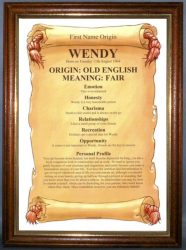


ARTICLE
- Find Meaning & Origin First NameThis essay explores the history of how Christian/First Names evolved, and provides information on how to discover a first name’s historical meaning and origin.
How To Find The Meaning & Origin of Your First Name.

We all have a nomenclature that carries you throughout the rich tapestry of life. However the very origin of an individual’s first name can have its roots in events that happened hundreds if not thousands of years ago. This concise article provides an insight on how Christian first names evolved; and also provides information on how to uncover a first name meaning and origin.

Imagine a rough woman Vikki Pollard lookalike on some sink estate, being interviewed for a TV documentary on large families. She has ten children all boys, and the interviewer asks how she calls them in from outside. Her reply is to bellow out ‘Wayne’s Get Your Backsides In Ere!’. The interview says, “This is unusual they all have the same first name; what happens if you need to call them down for tea”. She replies “All I do is shout out - Waynes’ get your backsides down for tea”. The interview says “Yes I see, but what happens if you only need to call one particular boy”. The rough woman replies “That’s easy I just use his surname!”
That joke just about sums up the basic purpose of First Names, they exist so people could call for the right people. And how they evolved encompasses a variety of origins and logic.
The origin of many
first (Christian) names can be found in religious texts; examples include Luke,
Matthew, and Michael. Other names can find the roots from words used in
languages including ancient olde English and Latin. Therefore Sophia (Sofia =
Wisdom), Alexander = Protector of Men. These names can be viewed as an attempt
to shape the lifestyle of an individual.
A first name can also be seen as being derived from titles and occupations such
as Sarah (Sara = Princess), or George (Georgios = Farmer). Another source of
names are from Objects; therefore we have Peter (Petra = rock) or Steven (Stephanos
= Crown). A variation of this is in the popularity of flowers as female names
(Rose, Lily). Other first name origins include specific Locations, examples
include Britney (Brittany) and Paris or Weather e.g. Foggy.
Ethnic first names
follow a similar logic, correlating with local customs, religion, and language.
Muhammad (or variants such as Mohammad) for example has obvious Arabic religious
origins with a generally accepted meaning of ‘The Praised One’ or ‘Praise
Worthy’.
An interesting thing to note about first names is how they can evolve in to a
multitude of forms. For example, the popular name Michael can be seen in other
forms as Mike, Mikel, Mikael, Miguel as well as in the feminine name Michelle.
For genealogists all this can be challenging when tracking down family tree members. Go back a hundred years or more education was such that many individuals did not know how to spell their name, but were just able to utter the syllables. The official recording names at a significant event such as birth, marriage, death may just simply take a calculated guess at the spelling of the name. This often explains why names both first and surnames can evolve into different spellings within the same family. This phenomenon may well be prevalent in the future within the UK given the relatively high rate of illiteracy within the current education system!
First names compliment surnames, these basically originate from five basic formats: Occupation (Cook, Smith, Parson), Descriptive (Black, Young), Location (Hill, Rivers); Trait/Expression (Hope, Goodwill), and Ancestry (Richardson, Simpson). Incidentally prior to the around the 10th Century surnames apparently did not exist, people didn’t travel much hence as long as every one in the small village was given a different Christian/first name there was no need. It is generally acknowledged that the first surname was of irish origin, this was recorded back in the year 916 for O’Clery (Ó Clerigh) in County Galway.
DAYBORN (
www.dayborn.com ) has several great personalised gift products based on
First Name Origins and Meanings. Not just UK and USA, but the meaning and
origin of just about any first name including those of ethnic origin can be
supplied. Available online including framed A4 and A3 versions. End of short
plug!
To conclude it is a rather ironic truism that for most people the nomenclature
they carry throughout their modern day lives, more than likely originated in the
thoughts of their ancestors living hundreds, if not thousands of years ago.

John D Henry BA BSc, Managing Director of DATALITE UK LTD
Picture Frames and Personalised Gift Products at www.dluk.info


